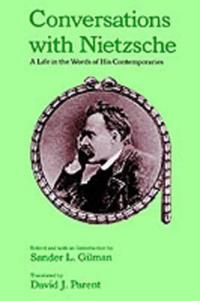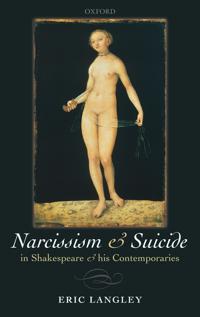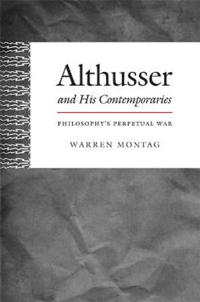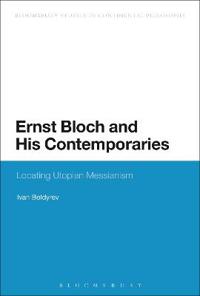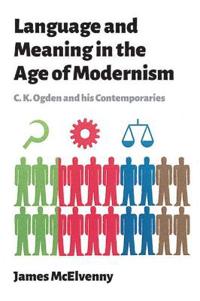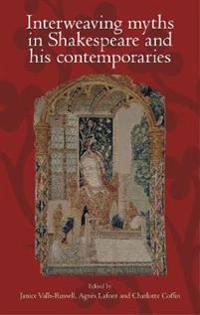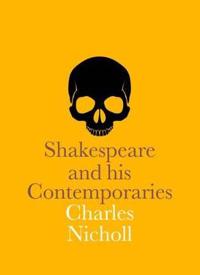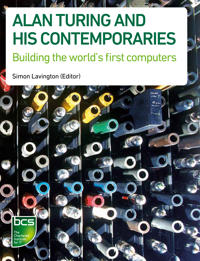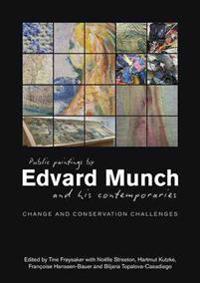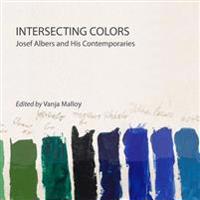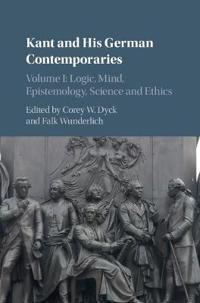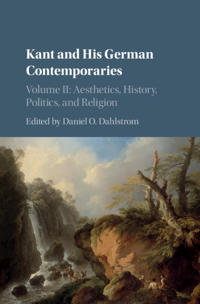Reminiscences of Leo Tolstoy (Häftad)
avHis Contemporaries, Contemporaries His Contemporaries
ISBN: 9781410203021 - UTGIVEN: 2002-12Conversations with Nietzsche: A Life in the Words of His Contemporaries (häftad)
ISBN: 9780195067781 - UTGIVEN: 1991-06This collection of memoirs, anecdotes and informal recollections by a broad range of reporters reflects both the reality and the myths surrounding Nietzsche. They cover the entire span of his life and recount his views on historical figures who influenced his thought, such as Goethe and Napoleon.[...]
Narcissism and Suicide in Shakespeare and His Contemporaries
ISBN: 9780199541232 - UTGIVEN: 2010-01The subjects of this book are the subjects whose subjects are themselves. Narcissus so himself himself forsook, And died to kiss his shadow in the brook. In accusing the introspective Adonis of narcissistic self-absorption, Shakespeare's Venus employs a geminative construction - 'himself himself' [...]
Jesus and His Contemporaries
ISBN: 9780391041189 - UTGIVEN: 2001-07Evans takes on the research from the Jesus Seminar. In the first part of his book, Evans shows us through comparative studies, the diversity of beliefs and actions that existed in the Jewish culture of which Jesus was indeed a part. Evans' goal is to understand better the Sitz im Leben Jesu. In the [...]
William Byrd and His Contemporaries: Essays and a Monograph (Inbunden)
avPhilip Brett
ISBN: 9780520247581 - UTGIVEN: 2006-10-30Encounters with Kierkegaard: A Life as Seen by His Contemporaries (Övrig)
avSoren Kierkegaard
ISBN: 9780691058948 - UTGIVEN: 1998-07-01Encounters with Kierkegaard is a collection of every known eyewitness account of the great Danish thinker. Through many sharp observations of family members, friends and acquaintances, supporters and opponents, the life story of this elusive and remarkable figure comes into focus, offering a rare po[...]
Althusser and His Contemporaries (Häftad)
avWarren Montag
ISBN: 9780822354000 - UTGIVEN: 201306Althusser and His Contemporaries alters and expands understanding of Louis Althusser and French philosophy of the 1960s and 1970s. Thousands of pages of previously unpublished work from different periods of Althusser's career have been made available in French since his death in 1990. Based on metic[...]
The Myth Of Rome In Shakespeare And His Contemporaries (Pocket)
avWarren L. Chernaik
ISBN: 9781107654075 - UTGIVEN: 2013-09-01Chernaik presents illuminating comparisons of Shakespeare's Roman plays with plays by Elizabethan and Jacobean dramatists including Jonson and Massinger.[...]
Zizek and His Contemporaries (Pocket)
avJones Irwin, Helena Motoh
ISBN: 9781441105134 - UTGIVEN: 2014-08-14Zizek and His Contemporaries (Inbunden)
avJones Irwin, Helena Motoh
ISBN: 9781441111784 - UTGIVEN: 2014-08-14Ernst Bloch and His Contemporaries (Inbunden)
ISBN: 9781472511768 - UTGIVEN: 2014-02Ernst Bloch and His Contemporaries is a much needed concise yet comprehensive overview of Ernst Bloch's early and later thought. It fills an important gap in research on the history of German thought in the 20th century by reconstructing the contexts of Bloch's philosophy, while focusing on his cont[...]
Ernst Bloch and His Contemporaries
ISBN: 9781474242066 - UTGIVEN: 2015-08Ernst Bloch and His Contemporaries is a much needed concise yet comprehensive overview of Ernst Bloch's early and later thought. It fills an important gap in research on the history of German thought in the 20th century by reconstructing the contexts of Bloch's philosophy, while focusing on his cont[...]
Language and Meaning in the Age of Modernism: C.K. Ogden and His Contemporaries
ISBN: 9781474425032 - UTGIVEN: 2018-06This book explores the influential currents in the philosophy of language and linguistics of the first half of the twentieth century, from the perspective of the English scholar C. K. Ogden (1889-1957). Ogden was connected to several of the most significant figures of the modernist period, including[...]
Interweaving Myths in Shakespeare and His Contemporaries
ISBN: 9781526117687 - UTGIVEN: 2017-10This collected volume proposes new insights into the uses of classical mythology by Shakespeare and his contemporaries, focussing on interweaving processes in early modern appropriations of myth. Opening up methodological perspectives on multi-textuality, its eleven essays show how diverse myths int[...]
Hafiz And His Contemporaries (Inbunden)
avDominic Brookshaw
ISBN: 9781848851443 - UTGIVEN: 2013-10-30This study will be of interest to scholars and students of comparative Arabic-Persian literature, and the ghazal in related Islamic literatures such as Urdu and Ottoman Turkish. It is also of value to the field of comparative literature more widely - Hafiz was a key influence on notable nineteenth-c[...]
Shakespeare and His Contemporaries (häftad)
ISBN: 9781855145801 - UTGIVEN: 2016-04William Shakespeare and his peers helped create not only a new kind of theatre in the Elizabethan era but also a new form of language. In an age of religious and political upheaval, they gave timeless expression to what it means to be human in works that continue to be staples of the Western canon. [...]
Pepys and His Contemporaries
ISBN: 9781855145856 - UTGIVEN: 2016-04Samuel Pepys's Diary stands with Shakespeare and the King James Bible as an indisputable treasure of English literature. As a picture of England, and especially of London, in the age of King Charles II, of Wren and Newton and Nell Gwyn, of the Plague and the Great Fire, it is a rare and honest repor[...]
Alan Turing and His Contemporaries (häftad)
ISBN: 9781906124908 - UTGIVEN: 2012-02Secret wartime projects in code-breaking, radar and ballistics produced a wealth of ideas and technologies that kick-started the development of digital computers. This is the story of the people and projects that flourished in the post-war period. By 1955 computers had begun to appear in the market[...]
Public Paintings of Edvard Munch and His Contemporaries: Changes. Conservation. Challenges. (häftad)
ISBN: 9781909492387 - UTGIVEN: 2016-02This publication contains papers from the 2013 conference Public Paintings by Edvard Munch and his Contemporaries: Change, Conservation, Challenges. The conference theme drew more than 100 European and American paintings conservators, cultural heritage scientists, collection specialists, art histori[...]
Intersecting Colors: Josef Albers and His Contemporaries (häftad)
ISBN: 9781943208005 - UTGIVEN: 2015-09Kierkegaard and His German Contemporaries (Inbunden)
avJon (EDT) Stewart
ISBN: 9780754661825 - UTGIVEN: 2007-09This volume explores in detail Kierkegaard's various relations to his German contemporaries. Kierkegaard read German fluently and made extensive use of the writings of German-speaking authors. Apart from his contemporary Danish sources, the German sources were probably the most important in the deve[...]
Kierkegaard and His German Contemporaries (Inbunden)
ISBN: 9780754662860 - UTGIVEN: 2008-05This volume explores in detail Kierkegaard's various relations to his German contemporaries. Kierkegaard read German fluently and made extensive use of the writings of German-speaking authors. It can certainly be argued that, apart from his contemporary Danish sources, the German sources were probab[...]
Kant and his German Contemporaries : Volume 1, Logic, Mind, Epistemology, Science and Ethics
ISBN: 9781107140899 - UTGIVEN: 2018-01This collection of new essays, the first of its kind in English, considers the ways in which the philosophy of Immanuel Kant engages with the views of lesser-known eighteenth-century German thinkers. Each chapter casts new light on aspects of Kant's complex relationship with these figures, particula[...]
Kant and his German Contemporaries
ISBN: 9781107178168 - UTGIVEN: 2018-10Kant's philosophical achievements have long overshadowed those of his German contemporaries, often to the point of concealing his contemporaries' influence upon him. This volume of new essays draws on recent research into the rich complexity of eighteenth-century German thought, examining key figure[...]


